Lawyering Peace
Episodes
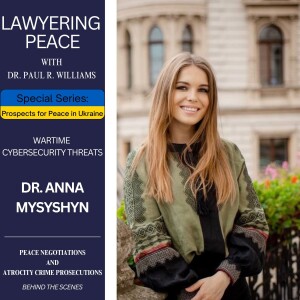
3 days ago
3 days ago
What happens when the battlefield moves online?
In this episode of Lawyering Peace, Dr. Paul R. Williams speaks with Dr. Anna Mysyshyn, a Ukrainian legal scholar and expert in AI ethics, cybersecurity, and digital governance. As the Founder of the Institute of Innovative Governance, Anna has helped shape Ukraine’s legal and strategic response to one of the most digitally complex wars in modern history.
Together, they explore the intersection of emerging technologies and armed conflict — from AI-generated disinformation and deepfakes to cyberattacks targeting Ukraine’s critical infrastructure. Anna unpacks the legal, ethical, and operational challenges posed by these threats and how Ukraine is adapting through regulation, digital resilience, and international cooperation.
🎧 Join us for a vital conversation about truth, technology, and law in the era of algorithmic warfare.
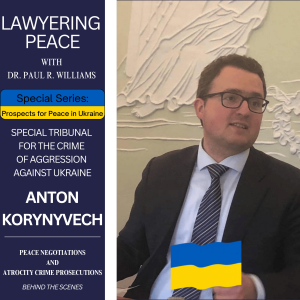
Friday Jun 27, 2025
Friday Jun 27, 2025
What does true accountability look like in the face of unprovoked aggression?
In this episode of Lawyering Peace, Dr. Paul R. Williams sits down with Dr. Anton Korynevych, Director of the Department of International Law at the Ministry of Foreign Affairs of Ukraine and one of the key legal architects of the proposed Special Tribunal for the Crime of Aggression against Ukraine.
Together, they explore the groundbreaking legal and diplomatic efforts underway to establish a new international judicial body capable of prosecuting Russia’s leadership for the crime of aggression — from the choice of model and jurisdiction to the broader international implications for law and justice.
Anton shares his front-line perspective on how this tribunal complements existing mechanisms like the ICC and the ICJ, why it matters beyond Ukraine, and what it signals to complicit states and the world at large.
🎧 Join us for a deep dive into legal innovation, geopolitical accountability, and Ukraine’s path to justice.
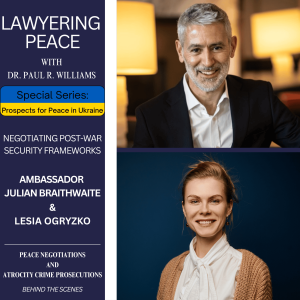
Wednesday Jun 18, 2025
A Post-War Security Framework for Ukraine with Lesia Ogryzko and Julian Braithwaite
Wednesday Jun 18, 2025
Wednesday Jun 18, 2025
What does it take to build lasting peace — and secure it?
What kind of security guarantees can truly deter renewed aggression?
In this episode of Lawyering Peace, Dr. Paul R. Williams is joined by Lesia Ogryzko, Director of the Sahaidachnyi Security Center, and Julian Braithwaite, former UK Ambassador to the UN and WTO, to unpack what a post-war security framework for Ukraine could and should look like.
Together, they explore how to negotiate credible security commitments that reflect the lessons of past failures — while embracing future-oriented strategies for deterrence, resilience, and international coordination.
From the role of the EU, US, and NATO, to the engagement of global players like China, India, and Brazil, the conversation examines how a pluralistic, robust security architecture can emerge from peace talks. The episode also confronts hard realities, including Russia’s continued threats and the challenges of military demilitarization demands.
🎧 Tune in for an expert dialogue on peace, power, and post-war security strategy.
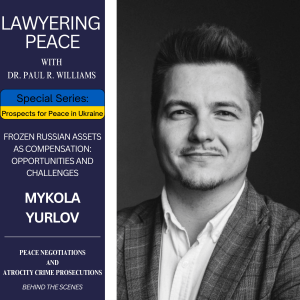
Friday Jun 06, 2025
Friday Jun 06, 2025
What are the legal and political pathways for using frozen Russian assets to compensate Ukraine?
And why has the transfer of these assets become a litmus test for the rules-based international order?
In this episode of Lawyering Peace, Ukrainian diplomat and legal expert Mykola Yurlov joins Dr. Paul R. Williams to discuss how frozen Russian sovereign assets could - and should - be used to support Ukraine’s reconstruction and deliver justice for victims of aggression.
Mykola held the position of Deputy Director of the Department of International Law and Cooperation at the Ministry of Justice, where he led both the International Disputes Unit and the Damage Compensation Unit. In these roles, he contributed to the development of an international compensation mechanism and to Ukraine’s proposal for a special tribunal for the crime of aggression. He also served as Senior Legal Counsel at Truth Hounds, a leading Ukrainian human rights organization documenting war crimes on the ground.
Mykola breaks down the legal foundation for asset transfers under international law, including the use of countermeasures and the principle of state responsibility. He outlines how these transfers would support the three-part international compensation mechanism: the Register of Damage, a future Claims Commission, and a Compensation Fund.
The conversation explores both the legal feasibility and the political resistance surrounding asset transfers, especially debates over sovereign immunity, reversibility, and potential financial precedent. Mykola explains why delay harms not only Ukraine, but the broader credibility of international law.
🎧 Tune in for a timely discussion on law, reparations, political will, and the global implications of frozen asset policy.
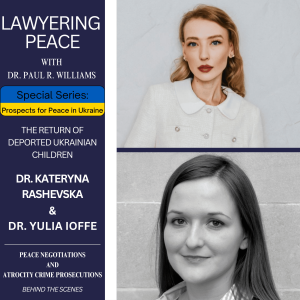
Friday May 30, 2025
Friday May 30, 2025
What does international law owe to Ukraine´s deported children?Why is Russia’s forced transfer of Ukrainian children a defining issue for global justice?
In this episode of Lawyering Peace, Ukrainian international legal experts Dr. Yulia Ioffe and Dr. Kateryna Rashevska join Dr. Paul R. Williams to discuss the illegal deportation of Ukrainian children to Russia and Russian-occupied territories—a policy many argue constitutes genocide.
They examine the strategic, ideologically motivated nature of the deportations: re-education, forced adoptions, name changes, and the erasure of Ukrainian identity. The conversation highlights how this tactic not only breaks international law but also threatens the integrity of the rules-based international order.
Drawing on their legal and advocacy experience, Ioffe and Rashevska reflect on the limits of current enforcement tools, the urgent need for repatriation and reintegration, and how the international community must close accountability gaps. They also explain how the legal response to these crimes could shape the future of child protection in armed conflict more broadly.
🎧 Tune in for a timely discussion on genocide, international law, and the moral and legal imperative to return Ukraine’s children.
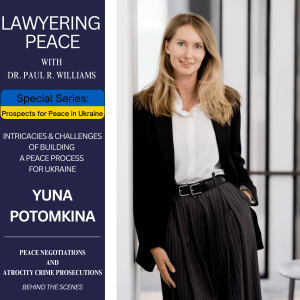
Friday May 23, 2025
Friday May 23, 2025
What does it take to negotiate peace when your opponent uses diplomacy as a tool for delay and manipulation?What lessons can we draw from the Minsk process to design a more durable peace in the future?
In this episode of Lawyering Peace, Ukrainian lawyer and mediator Yuna Potomkina joins Dr. Paul R. Williams to reflect on the shortcomings of past negotiations and the essential principles for shaping future peace talks between Ukraine and Russia.
Drawing from her experience as Adviser to the First Deputy Head of Ukraine’s negotiation delegation at the Trilateral Contact Group in Minsk (2020–2022), Potomkina explains why peace agreements without enforceable guarantees fall short—and why justice cannot be sidelined.
She unpacks the risks of rushed or externally driven negotiations, and makes a compelling case for Ukrainian-led, legally sound, and strategically aligned peace efforts.
The conversation highlights how mediators must navigate asymmetry, protect Ukraine’s red lines, and ensure accountability is non-negotiable.
🎧 Tune in for a powerful discussion on justice, strategy, and designing a peace process that can stand the test of time.
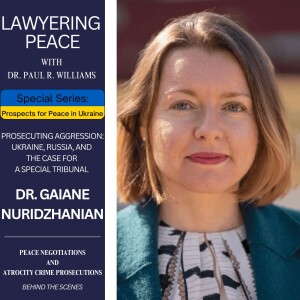
Thursday May 08, 2025
Thursday May 08, 2025
Why does the crime of aggression matter for Ukraine and international peace?
How can a Special Tribunal hold Russian leaders accountable?In this episode of Lawyering Peace, Ukrainian international lawyer Dr. Gaiane Nuridzhanian joins the conversation to explain the case for a Special Tribunal for the Crime of Aggression against Ukraine.
Dr. Nuridzhanian walks us through the evolution of the debate surrounding the crime of aggression, and presents a treaty-based tribunal—supported by Ukraine and the Council of Europe—as a legally sound, politically feasible alternative.
The conversation explores legal and strategic questions around the establishment of such a tribunal, from head-of-state immunity and trials in absentia to the inclusion of victims and its implications for future peace negotiations.
In a moment when the rules-based international legal order is under threat, our conversation with Dr. Nuridzhanian reminds us why prosecuting Russia’s war of aggression is critical not just for Ukraine, but for global accountability and future conflict prevention. Tune in for a timely discussion on justice, accountability, and international legal innovation.
-----------------------Ukraine and its allies stand at a critical juncture as they pursue a just and lasting peace and an end to Russia’s war of aggression. The road ahead is fraught with difficult issues that will arise during a future peace process, from territorial integrity and post-war security frameworks to EU accession and justice and accountability.
In this special mini-series, Prospects for Peace In Ukraine, we sit down with Ukrainian and international experts in law, diplomacy, and peace negotiations to explore some of these key issues. Together, we examine the strategies, options, and opportunities ahead as Ukraine and its allies navigate the peace process against a shifting international landscape.
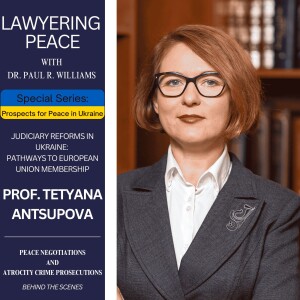
Tuesday Apr 15, 2025
Tuesday Apr 15, 2025
How is Ukraine reforming its judiciary while defending itself from Russian aggression?
What role does judicial reform play in Ukraine’s pursuit of EU membership and democratic transformation?In this episode, Prof. Tetyana Antsupova joins Dr. Paul R. Williams on the Lawyering Peace podcast.
Prof. Antsupova—former Supreme Court judge of Ukraine and British Academy Research Fellow—shares personal and professional reflections on the sweeping judicial reforms unfolding in Ukraine since 2014.
This episode examines how Ukraine is rebuilding judicial institutions in line with EU standards, balancing wartime pressures with long-term goals. Prof. Antsupova highlights the role of international experts, civil society, and European partners in building trust, advancing independence, and fostering resilience within the judiciary.
She also reflects on lessons from other EU states, the unique challenges of judicial reform during active conflict, and the urgent need for long-term strategic planning and public confidence in the rule of law.
This conversation demonstrates how Ukraine’s judiciary stands as a testament to resilience and reform in the face of aggression.
-----------------------Ukraine and its allies stand at a critical juncture as they pursue a just and lasting peace and an end to Russia’s war of aggression. The road ahead is fraught with difficult issues that will arise during a future peace process, from territorial integrity and post-war security frameworks to EU accession and justice and accountability.
In this special mini-series, Prospects for Peace In Ukraine, we sit down with Ukrainian and international experts in law, diplomacy, and peace negotiations to explore some of these key issues. Together, we examine the strategies, options, and opportunities ahead as Ukraine and its allies navigate the peace process against a shifting international landscape.
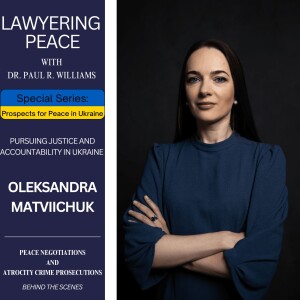
Monday Apr 14, 2025
Pursuing Justice and Accountability in Ukraine with Oleksandra Matviichuk
Monday Apr 14, 2025
Monday Apr 14, 2025
Is the system of international law today capable of effectively achieving justice and accountability for Ukraine?
How can accountability be made central to a future peace process—and not sacrificed for short-term political gain?
In the latest episode of the Lawyering Peace podcast, Oleksandra Matviichuk, Nobel Peace Laureate and Head of the Center for Civil Liberties, joins Dr. Paul R. Williams to discuss the pursuit of justice and accountability for atrocity crimes committed during Russia’s war of aggression.
Matviichuk outlines a comprehensive vision of justice—from prosecution and reparations to public truth-telling and recognition—and highlights the need for a Special Tribunal for the Crime of Aggression.
She warns against the sidelining of justice in peace negotiations, and calls for reform of the global legal order to adequately address impunity for international crimes. At the heart of her message is a powerful reminder: even when institutions falter, people have the power to shape history.
-----------------------Ukraine and its allies stand at a critical juncture as they pursue a just and lasting peace and an end to Russia’s war of aggression. The road ahead is fraught with difficult issues that will arise during a future peace process, from territorial integrity and post-war security frameworks to EU accession and justice and accountability.
In this special mini-series, Prospects for Peace In Ukraine, we sit down with Ukrainian and international experts in law, diplomacy, and peace negotiations to explore some of these key issues. Together, we examine the strategies, options, and opportunities ahead as Ukraine and its allies navigate the peace process against a shifting international landscape.
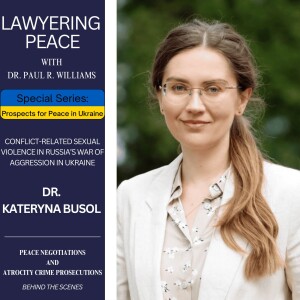
Thursday Apr 10, 2025
Conflict-Related Sexual Violence in Russia’s War in Ukraine with Dr. Kateryna Busol
Thursday Apr 10, 2025
Thursday Apr 10, 2025
How has Russia used conflict-related sexual violence as a tool in its war of aggression?
What does meaningful justice for survivors of Russia’s conflict-related sexual violence look like? In this episode, Dr. Kateryna Busol joins Dr. Paul R. Williams on the Lawyering Peace podcast.
Dr. Busol explores the widespread and systematic use of conflict-related sexual violence (CRSV) by Russian forces in Ukraine. Dr. Busol explores how societal norms and toxic gender hierarchies in Russia fuel the use of CRSV as a weapon of Russian aggression, and the impact on both survivors and Ukrainian society at large.
She thoughtfully explains the challenges that survivors face in seeking justice, and the ways in which female victims have spearheaded the effort to advocate for male survivors of CRSV.
Dr. Busol stresses the need for survivor-centered, gender-sensitive approaches to accountability, emphasizing that reparations should include not just financial compensation but also rehabilitation, symbolic recognition, and guarantees of non-repetition.
This discussion underscores the intersection of CRSV with broader peace and justice issues, highlighting the importance of a meaningful and holistic justice process. Dr. Busol reminds us that addressing such violence is key to achieving a sustainable, survivor-centered peace.
The conversation demonstrates the need to pursue a meaningful and holistic justice process for survivors of CRSV. Dr. Busol underscores the ways in which conflict-related sexual violence intersects with broader issues of peace and justice, demonstrating that addressing such violence is essential for a sustainable and survivor-centered peace.
-----------------------Ukraine and its allies stand at a critical juncture as they pursue a just and lasting peace and an end to Russia’s war of aggression. The road ahead is fraught with difficult issues that will arise during a future peace process, from territorial integrity and post-war security frameworks to EU accession and justice and accountability.
In this special mini-series, Prospects for Peace In Ukraine, we sit down with Ukrainian and international experts in law, diplomacy, and peace negotiations to explore some of these key issues. Together, we examine the strategies, options, and opportunities ahead as Ukraine and its allies navigate the peace process against a shifting international landscape.
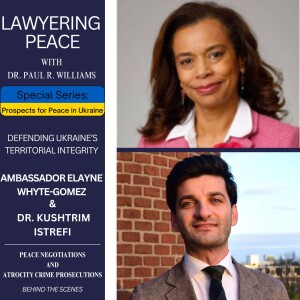
Thursday Apr 03, 2025
Thursday Apr 03, 2025
How can Ukraine protect its territorial integrity in peace negotiations?
What role does the international community play in ensuring that no territory is lost? In this episode, Ambassador Elayne Whyte Gómez of Costa Rica and member of PILPG’s Circle of Former Ambassadors, and Professor Kushtrim Istrefi of Utrecht University and PILPG Senior Peace Fellow, join the conversation.
Ambassador Gómez and Professor Istrefi explore questions relating to Ukraine’s territorial integrity and the central importance of maintaining its rightful territorial claims during peace negotiations.
Negotiations to end Russia’s war have gained momentum in recent weeks. However, the question of Ukraine’s occupied territories and their future status remains a key concern for Ukraine and its allies as they consider what a future peace agreement may look like.
Russia continues to deny the validity of Ukraine’s rightful claim to its internationally recognized borders as of 1991, and seeks to portray its war of aggression as . However, as our guests demonstrate, Ukraine’s claim is firmly rooted in international law. Our experts discuss the risks of unresolved territorial disputes, the role of international law, and outline practical tools at Ukraine and its allies’ disposal to maintain Ukraine’s territorial claim during peace negotiations, including international administration and non-recognition strategies.
In a war which Russia consistently claims is based on self-defense and self-determination, our guests remind us that it is crucial to keep focus on the reality of Russia’s invasion as a war of aggression against the territorial sovereignty of Ukraine. Tune in for a compelling discussion on how Ukraine can push back against historical distortions, build alliances, and secure its future.
-----------------------Ukraine and its allies stand at a critical juncture as they pursue a just and lasting peace and an end to Russia’s war of aggression. The road ahead is fraught with difficult issues that will arise during a future peace process, from territorial integrity and post-war security frameworks to EU accession and justice and accountability.
In this special mini-series, Prospects for Peace In Ukraine, we sit down with Ukrainian and international experts in law, diplomacy, and peace negotiations to explore some of these key issues. Together, we examine the strategies, options, and opportunities ahead as Ukraine and its allies navigate the peace process against a shifting international landscape.
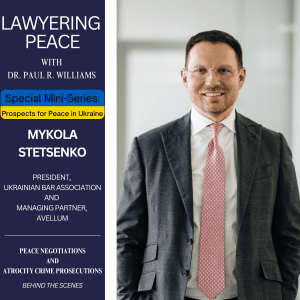
Monday Mar 24, 2025
Mykola Stetsenko on Ukraine's Path to Economic Renewal
Monday Mar 24, 2025
Monday Mar 24, 2025
In this episode of Lawyering Peace, we are joined by Mykola Stetsenko, President of the Ukrainian Bar Association, who speaks about the pivotal role of private sector investment in Ukraine’s post-war reconstruction. The conversation explores key industries primed for growth—agriculture, manufacturing, IT, energy, and logistics—as well as investment mechanisms such as public-private partnerships and industrial parks.
Stetsenko explains how Ukraine’s natural resource ownership model simplifies foreign investment, the government’s push to modernize industries rather than merely rebuild, and efforts to align with EU regulations. He also addresses common misconceptions about investing in Ukraine, the challenge of balancing economic development with environmental sustainability, and the policies designed to attract foreign investors by streamlining bureaucracy and fostering innovation.
With major multinationals already operating in the country and digital transformation reducing red tape, Ukraine presents compelling opportunities for forward-thinking investors. Tune in to discover how businesses can play a vital role in post-war recovery while seizing high-impact investment opportunities.
-----------------------Ukraine and its allies stand at a critical juncture as they pursue a just and lasting peace and an end to Russia’s war of aggression. The road ahead is fraught with difficult issues that will arise during a future peace process, from territorial integrity and post-war security frameworks to EU accession and justice and accountability.
In this special mini-series, Prospects for Peace In Ukraine, we sit down with Ukrainian and international experts in law, diplomacy, and peace negotiations to explore some of these key issues. Together, we examine the strategies, options, and opportunities ahead as Ukraine and its allies navigate the peace process against a shifting international landscape.